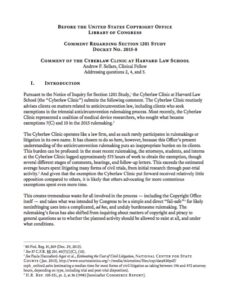 The Cyberlaw Clinic has filed a comment (PDF) before the Copyright Office as part of the office’s Section 1201 Study, which looks into copyright’s anticircumvention law, embodied in Section 1201 of the United States Copyright Act. Anticircumvention law prohibits bypassing or evading “technical protection measures” on copyrighted works — such as CSS encryption on DVDs or digital locks present on many eBooks — even if one’s use of the underlying work otherwise does not infringe copyright. As required in the statute, the Copyright Office holds hearings every three years to consider requests for temporary exemptions when the law works to prohibit noninfringing uses of others’ works. The Clinic’s comment in the 1201 proceeding addresses deficiencies present in the Office’s approach to this triennial rulemaking, and recommends a set of solutions.
The Cyberlaw Clinic has filed a comment (PDF) before the Copyright Office as part of the office’s Section 1201 Study, which looks into copyright’s anticircumvention law, embodied in Section 1201 of the United States Copyright Act. Anticircumvention law prohibits bypassing or evading “technical protection measures” on copyrighted works — such as CSS encryption on DVDs or digital locks present on many eBooks — even if one’s use of the underlying work otherwise does not infringe copyright. As required in the statute, the Copyright Office holds hearings every three years to consider requests for temporary exemptions when the law works to prohibit noninfringing uses of others’ works. The Clinic’s comment in the 1201 proceeding addresses deficiencies present in the Office’s approach to this triennial rulemaking, and recommends a set of solutions.
Because the Clinic routinely advises a variety of clients on anticircumvention law, it decided to file the comment in its own name, based on its prior experiences. (For example, the Clinic sought and obtained an exemption in the 2015 Anticircumvention Rulemaking on behalf of medical device patients and researchers conducting research into the safety and security of these devices.) In discussing problems with the Copyright Office’s current formulation of the rulemaking process, the Clinic sought to address three primary issues:
- how proponents of proposed exemptions should demonstrate they are “adversely affected” by the anti-circumvention prohibition;
- the evidentiary burden placed upon proponents; and
- whether the Copyright Office may consider issues beyond copyright in determining an exemption.
The first point concerns the process by which the Copyright Office determines that proponents are “adversely affected” by anticircumvention law and thus entitled to an exemption under the statute. The Clinic argues that the Copyright Office erected an unnecessary additional barrier for those seeking 1201 exemptions by demanding that proponents separately demonstrate “adverse effects” caused by the ban on circumvention beyond the criteria provided in the statute. The comment notes that Congress listed the specific factors the Copyright Office should consider when determining whether proponents have suffered “adverse effects” and that the current approach to the proceeding has abandoned these factors in favor of a long list of varied criteria that the Copyright Office considers. This makes briefing in the rulemaking proceeding much more burdensome for all sides (including for the Copyright Office itself).
Second, the Clinic argues that the evidentiary requirements placed upon proponents exceed what is required or allowed. The rulemaking proceeding is bound by the constraints of the Administrative Procedure Act (APA). In a rulemaking proceeding like this one, the APA requires a proponent to meet a burden of persuasion under a “preponderance of the evidence” standard (the same standard required of a plaintiff in civil litigation) and a burden of production that is “in accordance with” what is required to show a preponderance of the evidence. As shown in the comment, however, the Copyright Office has often construed this standard to require far more, by granting some exemptions only in “extraordinary circumstances,” where proponents can show a “substantial diminution” in their ability to make noninfringing uses of copyrighted works. As the Clinic notes, the evidentiary requirements of the APA cannot be replaced except by explicit changes in the law.
Lastly, while the Copyright Office has typically restrained itself from considering non-copyright issues when deciding whether to grant an exemption, the 2015 recommendation moved far beyond the bounds of copyright into issues of health, public safety, and environmental protection. The Clinic argues that, in so doing, the Office violated the clear intent of the statute (as evidenced by an examination of its legislative history). Although the statute accords the Office limited latitude to consider unnamed copyright issues like interoperability, that latitude does not equate with unfettered discretion to probe into regulatory matters far afield from the Copyright Office’s delegated authority and competence. Indeed, the Copyright Office cannot sustain such an interpretation without violating foundational constitutional principles of the delegation of power. The comment thus concluded that future rulemaking proceedings must solely focus on matters properly within copyright.
Cyberlaw Clinic students Sheri Pan (HLS ’16) and J. Ryan Thompson (HLS ’17) drafted the comment, along with Clinical Fellow Andy Sellars. The Cyberlaw Clinic was one of sixty-eight entities that filed comments in this study. All of the comments can be found on the regulations.gov website.
